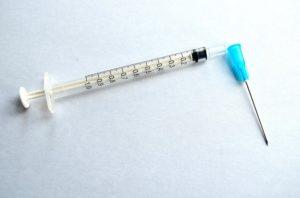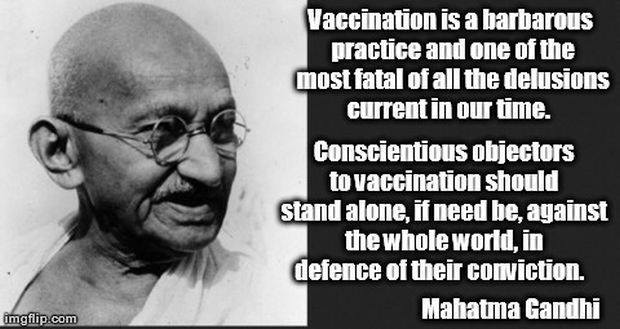 In our experience, parents usually spend a lot of time researching the pros and cons of vaccination before deciding whether to opt out of some or all of the currently recommended vaccines. They consider the scientific evidence challenging the status quo. They talk with their family physician. They talk with other parents. They weigh their options. They make an informed decision.
In our experience, parents usually spend a lot of time researching the pros and cons of vaccination before deciding whether to opt out of some or all of the currently recommended vaccines. They consider the scientific evidence challenging the status quo. They talk with their family physician. They talk with other parents. They weigh their options. They make an informed decision.
And still they’ve been called “ignorant” – and much worse – by individuals who have largely ignored or universally dismissed the scientific counter-evidence.
It’s hard to overstate the ugliness that emerged after the Disneyland measles outbreak was first reported last winter. Insults and accusations flew fast and furious in comment threads across the Web: “Your ‘right to choose’ could kill my child!” or “Parents who don’t vaccinate are child abusers and should be thrown in jail!” or “Anti-vaxxers are ignorant, science-hating wingnuts!”
Meantime, state after state rushed to remove personal belief and religious exemptions – actions that have been interpreted as so much “showboating.” Even the US Congress got into the act.
What’s amazing is how completely disproportionate such reactions are to the level of threat.
Once upon a time, measles was considered a normal childhood illness – something most everyone got and became naturally immune to. Seldom is it lethal, especially in industrialized nations. The odds of dying from measles has been calculated at 300 million to 1. You’re more likely to be killed by lightning.
You’re also far more likely to be killed by the practice of conventional medicine. Medical errors alone contribute to as many as 440,000 deaths each year. Pharmaceutical drugs taken as prescribed account for more than 100,000 hospital deaths a year and injure more than 2 million.
According to CDC data, the Disneyland outbreak led to 117 reported cases of measles. No one died.
That seems hardly enough to justify the elimination of informed consent – a fundamental right according to the American Medical Association’s Code of Medical Ethics:
The patient’s right of self-decision can be effectively exercised only if the patient possesses enough information to enable an informed choice. The patient should make his or her own determination about treatment. The physician’s obligation is to present the medical facts accurately to the patient or to the individual responsible for the patient’s care and to make recommendations for management in accordance with good medical practice.
Not the practitioner’s choice. Not the government’s choice. The patient’s choice – or, in the case of a child, his or her guardians’.
“The problem with the idea of forced vaccination,” wrote Dr. Frank Shallenberger in a recent newsletter,
is that there is absolutely no evidence at all that it could have prevented the recent Disneyland outbreak. The assumption has been made that the outbreak started from an unvaccinated individual. But that is just an assumption. The truth is that it could just as easily have been started by a vaccinated individual.
* * *
People recently vaccinated with a live virus vaccine can spread that virus for up to weeks or months after they received the drug. For example, the Johns Hopkins Patient Guide warns people with weak immune systems to “Avoid contact with children who are recently vaccinated,” and to “Tell friends and family who are sick, or have recently had a live vaccine (such as chicken pox, measles, rubella, intranasal influenza, polio, or smallpox) not to visit.”
Additionally, a statement on the website of St. Jude’s Hospital warns parents not to allow people to visit children undergoing cancer treatment if they have received oral polio or smallpox vaccines within four weeks, have received the nasal flu vaccine within one week, or have rashes after receiving the chickenpox vaccine or MMR (measles, mumps, rubella) vaccine.
But that’s not the only problem. Forced vaccination also presumes an impossibility: that we can completely prevent or destroy an infectious illness. Even after measles had been declared “eradicated,” people still got the measles.
Also consider that viruses, bacteria and other microbes – like all living things – adapt. As we adjust our defenses, they change in ways that give them a better chance of breaking them. We’ve seen it recently with the rise of “superbugs” in the wake of antibiotic overuse and “super weeds” in the wake of GMOs and increased pesticide use. Just last week came news of pests developing resistance to Bt corn.
Maybe one reason the response to measles has been so over-the-top is simply because it involves kids. If you believe in disputed concepts like “herd immunity” or don’t understand the role of the biological terrain (extracelluar matrix or milieu) in the body’s ability to self-regulate, then the possibility of unvaccinated children can only seem like a major threat.
But again, threats evolve. Instead of obsessing on external means of attack – with drugs, vaccines, or other such intervention – wouldn’t it make more sense to look at how we could better support our body’s natural defenses to respond appropriately when under assault?
That is the approach of biological medicine.
During the peak of the measles hysteria, you may have seen the powerful quote from Gandhi:

It comes from his book A Guide to Health, which includes another passage worth quoting at length as we consider the issue of what kind of health care makes most sense. We leave you to think about this:
We have got into the habit of calling in a doctor for the most trivial diseases. Where there is no regular doctor available, we take the advice of mere quacks. We labour under the fatal delusion that no disease can be cured without medicine. This has been responsible for more mischief to mankind than any other evil. It is of course, necessary that our diseases should be cured, but they cannot be cured by medicines. Not only are medicines merely useless, but at times even positively harmful. For a diseased man to take drugs and medicines would be as foolish as to try to cover up the filth that has accumulated in the inside of the house. The more we cover up the filth, the more rapidly does putrefaction go on. The same is the case with the human body. Illness or disease is only Nature’s warning that filth has accumulated in some portion or other of the body; and it would surely be the part of wisdom to allow Nature to remove the filth, instead of covering it up by the help of medicines. Those who take medicines are really rendering the task of Nature doubly difficult.